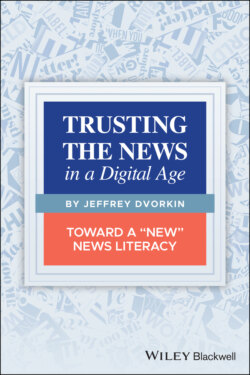Читать книгу Trusting the News in a Digital Age - Jeffrey Dvorkin - Страница 6
Definitions
ОглавлениеWhat is the news? The news is defined as the timely sharing of information of some public interest, created through a journalistic process. It is presented on a variety of media platforms. The news was and is a way of sharing common concerns and questions so citizens are able to make informed and reasoned choices.
What are media? Media are the various delivery systems used to present information, cultural expression, and other communications forms. Media content is delivered on a variety of platforms – such as print, broadcasting, and online – and can be news, cultural expression (such as music and art), and opinion. News is is the informational foundation of all subsets of media.
When we talk of news literacy, we also need to discuss media literacy overall, because both are connected.
Media platforms are the mechanisms through which we experience the world, whether it is through news, culture, or ideas. The news is one of many content constructs transmitted on a variety of media platforms. If those platforms are not properly understood, or even misused, then the content that is presented on them can also be misunderstood.
Literacy is the ability to make sense of the world and be understood through the ability to read, write, spell, listen, and speak. It is also about being competent and knowledgeable in a specified area.
Media literacy involves the practices that allow the public to access and to critically evaluate various media expressions. Media literacy is understanding how media assumptions about our culture operate. It is also about determining which cultural presuppositions need to be analyzed and deconstructed in order to properly understand how specific media operate.
As a result, news literacy concerns applying similar critical thinking skills to the various content of specific newspapers, broadcast information, and online presentations.
One way to understand the need for both media and news literacy is to understand the historical origins and the economic underpinnings of how media operate. The economic consequences are critical to understanding how the news works and on whose behalf, since the news is often a first portal into the larger media landscape.
All media and their news expressions remain driven by economic and political interests. Some of those influences can be benign, such as the need to create a community of interests around local events. They can also be a part of an effort to properly inform the public about issues that have previously been unknown. This is known as “investigative reporting.” Other influences are designed to extract profits through monetizing the distribution of information that citizens might find interesting or useful. This can be problematic in certain cases.
